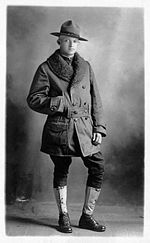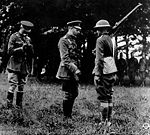- Doughboy
-
Doughboy is an informal term for an American soldier, especially members of the American Expeditionary Forces (AEF) in World War I. The term dates back to the Mexican–American War of 1846–48.
The term was used sparingly during World War II, gradually replaced by the appellations "G.I.", "Troop", or "Dogface", but was still used in popular songs of the day, as in the 1942 song "Johnny Doughboy found a Rose in Ireland."[1] It dropped out of popular use soon after World War II.[2]
Contents
Etymology
The term was in use in the 1840s.[3][4] The origins are unclear. The most often cited explanation is that it arose during the Mexican–American War, after observers noticed U.S. infantry forces were constantly covered with chalky dust from marching through the dry terrain of northern Mexico, giving the men the appearance of unbaked dough.[5] Another suggestion is that doughboys were so named because of their method of cooking field rations of the 1840s and 1850s, usually doughy flour and rice concoctions baked in the ashes of a camp fire, although this does not explain why only infantryman received the appellation.[5]
Still another explanation involves pipe clay, a substance with the appearance of dough used by pre-Civil War soldiers to clean their white garrison belts. The uniforms that were worn by American soldiers in the World War I era had very large buttons. The soldiers from allied nations suggested that the Americans were dressed like "Gingerbread Men" and then began to refer to the Americans as The Doughboys.[citation needed]
References
- ^ The Dogface Soldier: Times were changing, though; that same year, two infantry soldiers wrote The Dogface Soldier, later officially adopted as the song of the U.S. 3rd Infantry Division.
- ^ George, John B. (Lt. Col), Shots Fired In Anger, Samworth Press (1948), pp. xi, xii, 21: Lt. John George, an Army officer writing a World War II autobiographical postwar combat memoir in May of 1947, freely used the term to describe himself and his fellow U.S. Army infantrymen.
- ^ Dana, Napoleon Jackson Tecumseh (Lt), Monterrey Is Ours! The Mexican War Letters of Lieutenant N.J.T. Dana, 1845-1847, University of Kentucky Press (1990), ISBN 0813117038, 9780813117034: Lt. Dana, an infantryman in the Mexican-American War, wrote in a letter posted during the campaign, "We 'doughboys' had to wait for the artillery to get their carriages over."
- ^ Chamberlain, Samuel, My Confessions: Recollections of a Rogue, Austin: Texas State Historical Association (1965): Chamberlain, a horse-mounted Dragoon in the Mexican-American War, wrote in his memoirs years later, "No man of any spirit and ambition would join the 'Doughboys' and go afoot."
- ^ a b Hanlon, Michael E., The Origins of Doughboy, 16 June 2003, Origin of Term Doughboy
Further reading
- Faulstich, Edith. M. "The Siberian Sojourn" Yonkers, N.Y. (1972-1977)
- Gawne, Jonathan. Over There!: The American Soldier in World War I (1999)- 83 pages, heavily illustrated
- Grotelueschen, Mark Ethan. The AEF Way of War: The American Army and Combat in World War I (2006) excerpt and text search
- Hallas, James H. Doughboy War: The American Expeditionary Force in World War I (2nd ed. 2009) online edition; includes many primary sources from soldiers
- Hoff, Thomas. US Doughboy 1916-19 (2005)
- Kennedy, David M. Over Here: The First World War and American Society (1980) excerpt and text search
- Schafer, Ronald. America in the Great War (1991)
- Skilman, Willis Rowland. The A.E.F.: Who They Were, what They Did, how They Did it (1920) 231 pp; full text online
- Smith, Gene. Until the Last Trumpet Sounds: The Life of General of the Armies John J. Pershing (1999), popular biography.
- Snell, Mark A. Unknown Soldiers: The American Expeditionary Forces in Memory and Remembrance (2008)
- Thomas, Shipley. The History of the A. E. F. (1920), 540pp; full text online
- Votow, John. The American Expeditionary Forces in World War I (2005) - 96 pp; excerpt and text search
- Werner, Bret. Uniforms, Equipment And Weapons of the American Expeditionary Forces in World War I (2006)
See also
- American Expeditionary Forces - the formal name
- Dogface (military)
- Frank Buckles - last Doughboy from World War I until his death in 2011.
- Poilu - equivalent term for French soldiers of World War I
- Tommy Atkins - equivalent term for British soldiers of World War I
External links
- Doughboy Center stories from the AEF
- [1] Last "Doughboy" dies at 110
Categories:- Military slang and jargon
- United States Army
Wikimedia Foundation. 2010.


